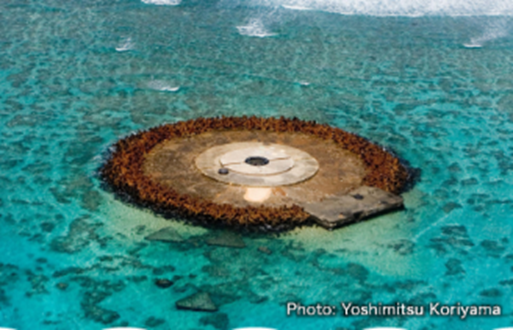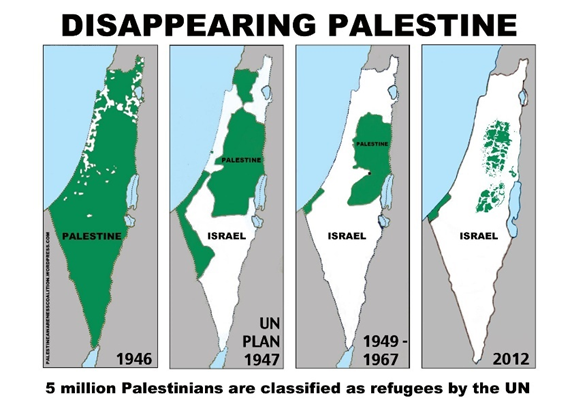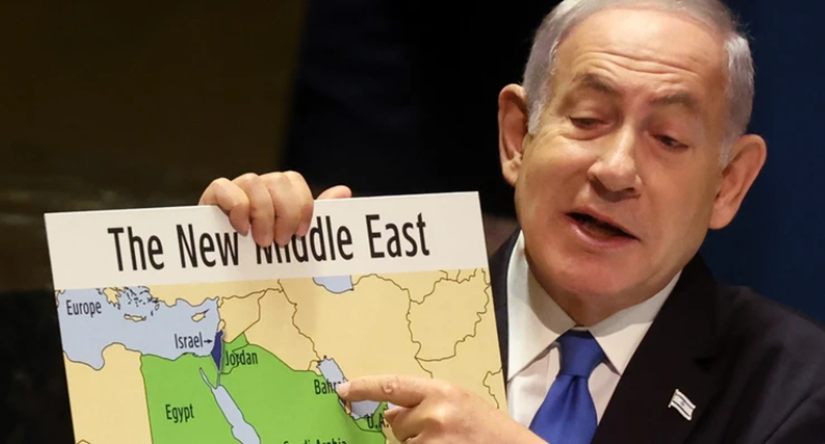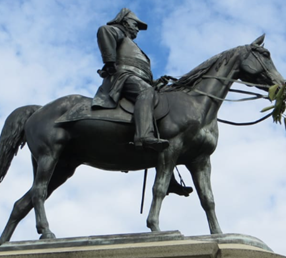(The facts cited here come from the Warren Commission Report, henceforth referred to as “WCR”, and the book History Will Not Absolve Us by E. Martin Schotz, henceforth referred to as “Schotz”)
I was in Dallas recently and used the opportunity to visit the Texas School Book Depository from whose sixth-floor window Lee Harvey Oswald reputedly shot President Kennedy on November 22, 1963. I learned something I hadn’t known before which has enabled me to pin down who actually did the shooting. What I learned was that the building’s two freight elevators were stuck at the fifth and sixth floors at the time of the shooting. That got me to speculating on how the assassin—whoever he might be—descended from the “sniper’s nest” on the sixth floor.
First, let’s eliminate Oswald as a suspect. The fact that the best marksmen in the world have been unable to duplicate the feat Oswald supposedly accomplished—firing three shots on target in just over 5 seconds using a second-rate rifle with a misaligned telescopic sight (Schotz, p. 110)—proves if Oswald was the shooter, he wasn ‘t the only one (The lone gunman theory can be resurrected if it is assumed a more sophisticated rifle than Oswald’s, an automatic, was used, as the 3-shots-in-5+-seconds feat then becomes more plausible). That Oswald was not even one of the assassins is attested to by Dallas Police Chief Jesse Curry who, belatedly, came to believe in Oswald’s innocence because the test administered on Oswald’s right cheek showed no presence of gunpowder residue, i.e., Oswald had not fired his Italian carbine, or any rifle, that day (Schotz, p. 232).
Further proof, for me, that Oswald could not have been the shooter is based on what I had learned about the Depository’s elevators. Their being on the fifth and sixth floor at the time of the shooting set me to wondering how Oswald had made it to the second floor in time to be seen by Dallas patrolman Marion Baker less than a minute and a half after his final shot? According to the Commission, that first shooting occurred at 12:30 PM (WCR, pp. 48-49). Baker, accompanied by the building’s superintendent, Roy Truly, was racing up the stairs (since the elevators weren’t available) when he saw Oswald walking toward the lunchroom (The commission estimates this was a minute and 20 seconds after the shots were fired, WCR, p. 152). When Truly identified Oswald as a Depository employee, the two continued the climb to the roof, from where Baker thought the shots had been fired (WCR, p. 151-152). Oswald proceeded to the lunchroom, where, apparently in no hurry, he bought a Coke at a vending machine, and proceeded to exit by the building’s front door.
Oswald’s Olympian sprint down the stairs (so quiet no one either heard or saw him) was tested by the Commission, which found the time required to go from the sniper’s nest in the southeast corner of the building, down an aisle along the east wall, place a rifle near where Oswald’s rifle was found, walk along the north wall to the stairwell in the northwest corner of the building, go down four flights of stairs, and walk into the second-floor lunchroom was 1 minute and 18 seconds at a normal pace (Baker, in his affidavit, stated Oswald was not out of breath when accosted, WCR, Vol. 4, p. 248). The horizontal distance traversed was about 125 feet along the walls, plus the distance to where the rifle was hidden, the 20 or so feet of the four landings, and the 25 or so feet from the stairwell to the lunchroom, for a total of around 180 feet. The vertical distance was four flights of stairs, each floor having a height over 10 feet.
I challenge the Commission’s timing. Try it yourself and see what you come up with. Note that the Commission’s run included placing a rifle near where Oswald’s was found, not where it was found. This photo of Oswald’s rifle in situ suggests it was more than a momentary pause to place the rifle amongst all those boxes.
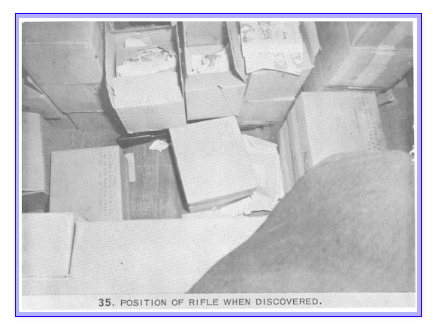
Moreover, it’s not clear if the test included being impeded by boxes, as this photo suggests probably was the case:

If the time cited by the Commission is a gross underestimate, particularly for someone who was 5’9” and maybe not in the best shape, Oswald cannot be the shooter. Oswald was just the “patsy”, as he claimed in his one public statement. A retesting of the time it takes to get from the sniper’s nest to the lunchroom is called for.
If Oswald wasn’t the shooter, who was? To frame Oswald as the presicide, there would have had to be a handler. I think this person would necessarily have to be an employee of the Depository, and perhaps live in the same boarding house in South Dallas as Oswald, in order to perform the tasks required of him:
- Obtain the three shell casings found in the “sniper’s nest” (Perhaps by expressing an interest in purchasing Oswald’s rifle and borrowing it to test it);
- Arrange for Oswald to bring the rifle to the Depository on that fateful day by setting that date for the handler to purchase the rifle;
- See that Oswald was in the depository (not outside watching the parade) at the time of the shooting but not in the presence of anyone who knew him (and could be his alibi);
- Get himself up to the sniper’s nest without being seen, having planted Oswald’s rifle and his own more sophisticated gun on the sixth floor beforehand (the only evidence tying Oswald’s rifle to the shots on the motorcade are two bullet fragments, found in the Presidential car after it had been returned to Washington (WCR, p. 76), so damaged the Commission admitted they couldn’t be sure whether they were fragments from two bullets or parts of a single bullet (WCR, p. 85));
- See that the elevator was on the sixth floor with its safety gate down to prevent anyone from coming up to the 6th floor while the assassination was in progress, as the elevator was inoperable when the safety gate was down (WCR, p. 143);
- Get himself down from the 6th floor without being seen after disassembling his gun and hiding it in one of the many boxes, which he had plenty of time to accomplish as the sniper’s nest was not found till half an hour after the shooting (WCR, p. 79).
So who was this handler/shooter? He would be the person among the Depository’s employees who
- Was hired only a couple of months before the assassination (Oswald started working at the Depository a month before.);
- Was not in the presence of any people who knew him (e.g., other employees) at the time of the shooting;
- Used an assumed name;
- Had a connection with anti-Castro Cubans.
Find the employee who fits that description and you have your assassin.
Why is it important to learn the full story behind Kennedy’s assassination? By failing to provide air support for the anti-Castro Cubans who tried to invaded their homeland in 1961, by negotiating a reciprocal agreement with the Soviets during the 1962 Cuban Missile Criss under which the Soviets removed their missiles from Cuba and we removed ours from Turkey instead of just issuing an ultimatum to the Soviets, for daring to enlighten Americans to the fact the Soviet Union had experienced a loss in the Second World War “equivalent to the devastation of this country, east of Chicago” (Schotz, p. 44), for committing his administration “to build a world at peace where the weak are safe and the strong are just” (Schotz, p. 49) Kennedy had incurred the animosity of the deeply entrenched, bellicose, “If you want peace, prepare for war” faction of our power elite—the “military-industrial complex” Eisenhower warned us about. Whoever was behind it, Kennedy’s assassination was a victory for these hegemony-pursuing world-beaters, restoring them to dominance in the determination of our foreign policy, a dominance they enjoy to this day.
What a different world it might have been had Kennedy lived! Our relations with Cuba might have been normalized decades ago, our incipient intervention in Vietnam might not have led to all-out war, and a 40-year Cold War which saw resources wasted on both sides building an arsenal of 30,000 nuclear bombs might have been avoided. We might now live in a world at peace instead of the perilous world of today, which threatens our very existence. By discrediting the hawks of his day and, by extension, their successors in our own time, the truth of the tragedy that occurred on November 22, 1963 might save us from World War Final.
